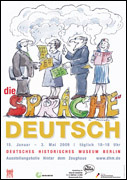


Exhibition
| Language and Language Acquisition
| History of the Language
The Art of Writing and Speaking
| Language and Technology
| The Living Language
Language is a means of communication peculiar to human beings.
It serves the mutual understanding of desires, thoughts and experience,
the exchange of information as well as the preservation of knowledge.
It differs from other forms of communication such as animal languages
through the use of prearranged symbols, for the relationship
between a linguistic expression and the thing it denotes is arbitrary
and only comes about by means of an agreement between the speakers.
The first forms of expression were primitive gesticulations and
gestures; a differentiated spoken language was added only later.
An anatomical transformation in the vocal tract was a
prerequisite for spoken language. A lowering of the larynx
and the lingual bone gave the tongue of modern man
considerably more room compared with that of apes.
There are some 6000 to 7000 languages worldwide,
which are assigned to different language families.
Research is now in a better position to explain how
children are able to master the complex task of acquiring
a language. The puzzle of language acquisition,
however, is by no means completely solved.
